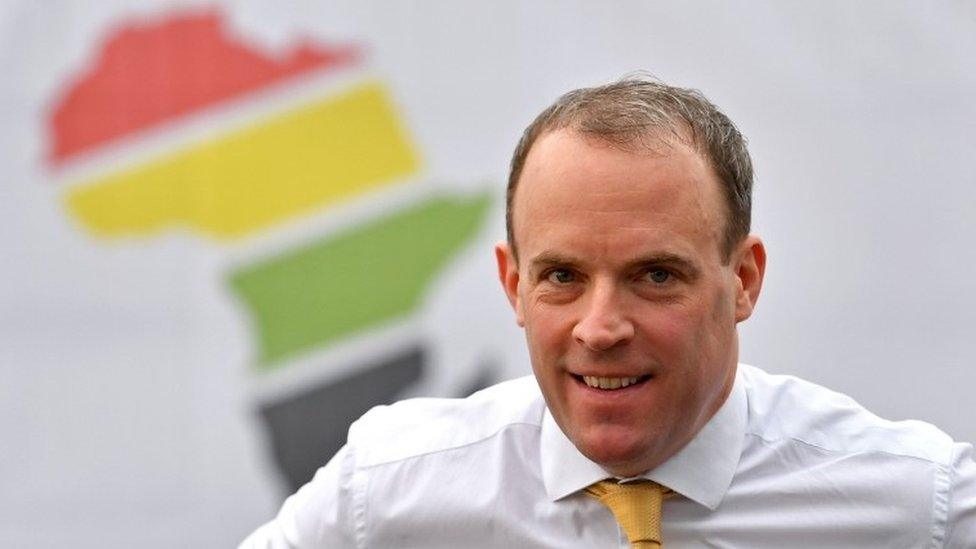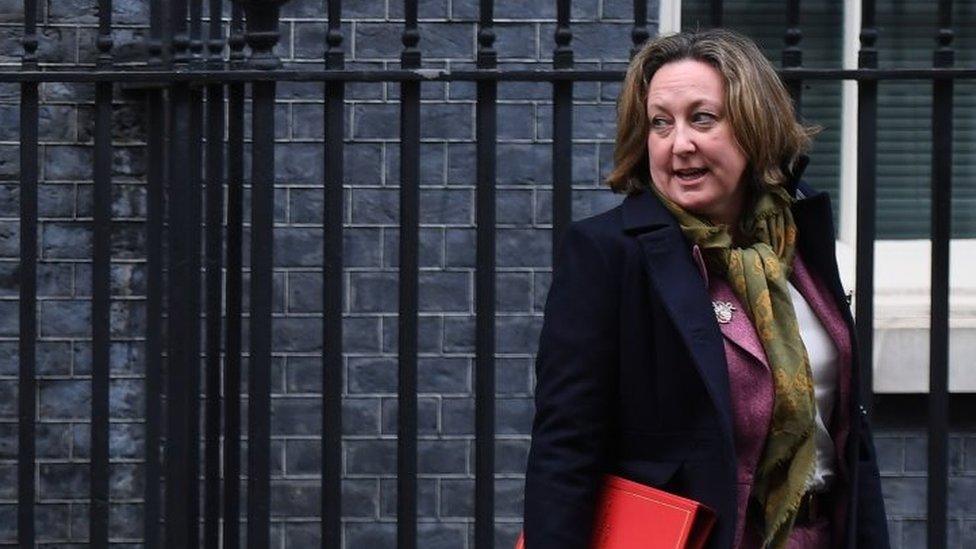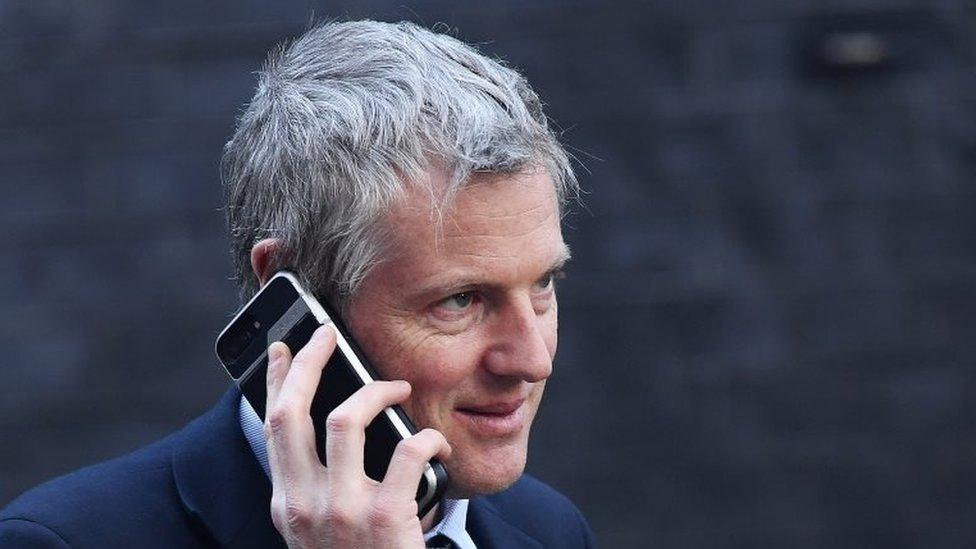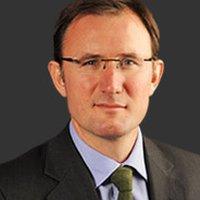Cabinet reshuffle: International development and Foreign Office merger?
- Published

Dominic Raab at a UK-Africa investment summit last month
Beneath the unexpected bloodletting of his cabinet reshuffle, Boris Johnson has quietly but radically reformed the way his ministers will handle foreign affairs.
For the prime minister has decided that every single junior Foreign Office minister will also be a joint minister with the Department for International Development.
Or vice versa, depending on your view down Whitehall.
There are now seven ministers who hold this hybrid duality: the ministers of state - James Cleverly, Nigel Adams, Lord Ahmad and Lord Goldsmith - and the parliamentary under secretaries of state James Duddrige, Wendy Morton and Lady Sugg.
This is not the first time there have been ministers with joint roles in different departments. The practice was common in the New Labour years and continued under David Cameron.

Anne-Marie Trevelyan is the new International Development Secretary
Francis Maude was a minister both at the Foreign Office and the Department for Business, Innovation and Skills. Lady Warsi was at the Foreign Office and the Department for Communities and Local Government.
But the practice of having joint FCO/DFID ministers is relatively new.
It was first used by Theresa May in 2017. She wanted to try to get both departments working more closely. Alistair Burt and Rory Stewart were the first incumbents.
Before Thursday's reshuffle, their respective roles were held by Andrew Murrison and Andrew Stephenson, both of whom have moved on.
Battle royal
It is, however, unprecedented for every single junior minister in both departments to have a joint role.
And it raises many questions.
How will their responsibilities be divided up?
To whom will they be accountable - Dominic Raab, the Foreign Secretary. or Anne-Marie Trevelyan, the new International Development Secretary?

Lord Goldsmith is one of the ministers with a dual role
Will these ministers have one or two private offices? Some FCO sources suggest they will have one, some DFID sources say two.
Will their private secretaries be FCO or DFID? There may be a battle royal as officials divide up the spoils.
Then there is the bigger question: is this just the start of things to come?
'Takeover by stealth'
In DFID some folk are breathing a sigh of relief that their department has not been merged into the FCO, as had been predicted.
They insist they still have an independent department with an independent secretary of state.
But the prime minister is on record in calling for such a change in the past.
Senior ministers talk of DFID "running a shadow foreign policy" and the need to adopt a more joined-up approach.
And there is still a strong vein of traditional aid scepticism on the Tory backbenches.
Some folk will wonder if this ministerial merger is merely a taste of things to come.
One former minister described the changes to me as "a takeover by stealth".
Some in government see the reshuffle as a stay of execution for DFID, the start of a period of probation in which the department has a chance to prove it can do joined up foreign policy without the need for full amalgamation with the FCO.
It is easy to forget that DFID - or its equivalent - has been in and out of the Foreign Office since the Ministry of Overseas Development was first created in the 1960s. It only separated from the FCO in its current form under Tony Blair in 1997.
'Delivering results'
What is clear from my own discussions with senior Whitehall sources is that this administration remains determined to provide UK aid policy with greater political direction, so that the £14bn budget does not just help tackle extreme poverty but it also promotes Britain's national interests.
Quite how they try to do that remains unclear. But a joint ministerial team is a clear step in that direction.
As Anne-Marie Trevelyan tweeted this morning: "I want to show the British public we are delivering the best results for their aid, transforming the lives of the world's poorest and most vulnerable people, while promoting Britain's economic and security interests."
The new DFID Secretary of State has in the past been sceptical about UK aid, with comments and retweets indicating she questioned the priorities of spending taxpayers' money helping the poor overseas.
But in her first statement in the new role she said the government remained committed to spending 0.7% of its income on development: "I know from my previous role as Armed Forces Minister how UK aid, alongside our world class defence and diplomacy, supports peace and prosperity around the world.
"As International Development Secretary I will ensure that UK aid promotes girls' education around the world, tackles climate change, works to end preventable deaths and helps countries receiving aid become self-sufficient."
For DFID, this reshuffle marks a continuing period of ministerial instability.
The department has now had six secretaries of state in the last four years. Justine Greening left in July 2016, followed by Priti Patel (16 months), Penny Mordaunt (19 months), Rory Stewart (3 months), Alok Sharma (6 months) and now Ms Trevelyan.
And for the Foreign Office, this is also a time of yet more change.
Revolving doors
It has just lost four ministers: Chris Pincher, Andrew Murrison, Andrew Stephenson and Heather Wheeler, all of whom were appointed only in July last year, along with Dominic Raab.
Lord Ahmad is the longest serving minister, appointed in June 2017.
This means there is a lot of new blood in King Charles Street but little institutional memory. That can mean a power shift to officials but it rarely helps UK foreign policy.
Much diplomacy is about relationships. Foreign governments are rarely impressed by revolving doors.
Longstanding former Foreign Office ministers like Alistair Burt, David Lidington and Alan Duncan were effective because they were known and trusted by ministers and officials around the world.
They could engage in the discreet conversations that quietly promote UK national interests in the corridors of power.
All that is harder with a bunch of newly-appointed ministers trying to work out who their boss is and where the coffee machine is kept.
